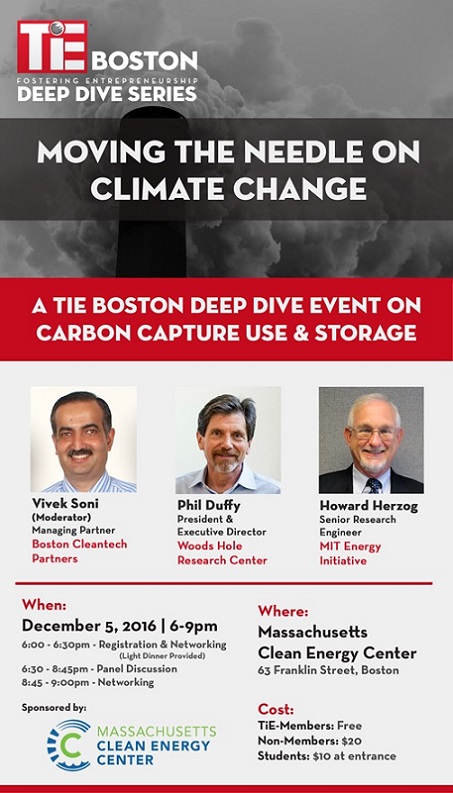Contribute
| Moving The Needle On Climate Change |
Vivek Soni
01/03/2015
We live in a world that is still very dependent on fossil fuels. Last December, progress was made in Paris & COP21 with the adoption of the international climate agreement which was adopted by 195 countries and applicable to all. In the past five years, significant progress has been made regarding global deployment of solar energy and wind energy, with installed capacity of renewables now exceeding that of coal.
In September 2016, the concentration of carbon dioxide in earth’s atmosphere, as measured at the National Oceanic and Atmospheric Administration's Mauna Loa Observatory in Hawaii, surpassed 400 parts per million during the annual low point of the Earth's CO2 cycle, and it's not expected to dip below that threshold anytime soon. The Intergovernmental Panel on Climate Change (IPCC) has warned that CO2 levels should not exceed 450 ppm to prevent 2 degrees Celsius of warming, the temperature change by which experts estimate significant and deadly climate change will occur. These may include the self-reinforcing processes of permafrost thawing and mass loss from the Greenland ice sheet. For this reason, the Paris agreement speaks of the desirability of limiting global warming to 1.5º C.
Assessments by the IPCC and others find that we will probably not be able to limit warming to either 1.5 or 2º solely by stopping emissions of CO2 from the atmosphere. In addition, we will need to remove massive quantities of CO2 from the atmosphere - probably between about 400 and 1,000 billion tonnes.
Phil Duffy, the President and Executive Director of the Woods Hole Research Center (WHRC), has been very vocal about dangers of the melting of ice sheets and GHG emissions from permafrost thawing and the need to remove CO2 from the atmosphere. The International Center for Climate Governance has rated WHRC as the #1 Climate Change Think Tank in the World, for three years running.
In this TiE Boston Deep Dive event on December 5 at the MassCEC office in Boston, Phil Duffy will present the case for why it is important to pay attention to carbon dioxide reduction in the atmosphere by forestry and other means. Howard Herzog will follow Phil's presentation. Howard is the leading researcher at MIT on carbon capture, use, and storage (CCUS). The MIT research program, initiated in 1989, has become internationally recognized as a leader in this field. Their research examines carbon sequestration from multiple perspectives, including technical, economic, and political.
CCUS addresses a major weakness of fossil fuels by reducing their carbon dioxide emissions to near zero. It has several strengths. Unlike wind or solar, it can produce power when it's needed. It is the most efficient form of clean energy for energy-intensive industries like cement, refineries, petrochemicals and iron and steel. It's compatible with our fossil fuel infrastructure, which supplies over 80 percent of the commercial energy used today, and its capacity to produce negative emissions when combined with biomass-fired power plants. How to do this is perhaps the greatest unsolved technical and policy problem in climate change.
Going forward we will need a comprehensive approach often referred to as an “all of the above strategy†to meet our energy needs. Done right, carbon capture can play an important supporting role, allowing us to reduce carbon pollution from power plants and industrial facilities. While there is much focus on reducing GHG emissions, there is little discussion about managing the actual GHG levels in the atmosphere. This event will help shine a light on what needs real attention and what are some realistic options to move the needle on climate change. A panel discussion will cover the broader aspects of emission reductions in the context of the changes in Washington D.C.
Participants:
Phil Duffy - The case for carbon removal
Howard Herzog - Technology solutions for carbon capture, use and storage
Panel discussion:
Michael Harrington - Enhanced carbon capture by trees
Adam Pool - European perspective on emission reduction
Peter Fox Penner - Emission reductions
Other speakers being confirmed
Vivek Soni - Event organizer and moderator
Here is a link for discounted registration. https://www.123signup.com/register?id=nsbps
($10 for non TiE Boston members / free for TiE Boston members)
($10 for non TiE Boston members / free for TiE Boston members)
You may also access this article through our web-site http://www.lokvani.com/
